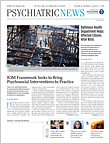Mr. J is a 41-year-old single Caucasian with a psychiatric history of schizoaffective disorder, cannabis use disorder, alcohol use disorder, and stimulant intoxication. He had been generally nonadherent with psychiatric medications and did not follow up regularly with his primary care physician. His medical history is significant for obesity, hyperlipidemia, hypertension, and metabolic syndrome.
Mr. J was brought in by police after patrons in a local market reported that he was exhibiting bizarre behavior. He quickly became belligerent and combative when approached by police and paramedics. He had been brought to the emergency department under similar circumstances a year previously and was admitted to inpatient psychiatry at another facility. No other documentation is available.
Lab work is significant for positive urine toxicology for cannabis, a negative blood alcohol level, and a mild transaminitis. His current medications are unknown. The paramedics administered 2 mg of intravenous midazolam en route in response to persistent agitation while restrained on the gurney. His last set of vital signs is notable for a blood pressure of 182/98 mm Hg and tachycardia into the 120s but otherwise unremarkable. From the gurney, the patient continues to speak loudly but also mumbles under his breath even when not spoken to; his speech includes ideas about “government nanotechnology.” He is malodorous and disheveled, has poor dentition, and his clothes are inappropriate for cold weather.
Agitation is a principal reason for patients to be evaluated by psychiatric emergency services. This complex condition arises from multiple etiologies while also being a symptom that complicates several primary psychiatric conditions. For example, in this case, the patient’s agitation may be due to his underlying psychiatric illness, substance misuse, a medical cause, or a combination of these and possibly other conditions. The challenge of approaching an agitated patient is maintaining patient and staff safety while working through the differential to identify and address the key underlying cause.
These are among the clues in this case to help work through the differential:
•
The patient has a known diagnosis of schizoaffective disorder with a history of medication nonadherence. He is mumbling under his breath and discussing elements of a paranoid delusional system. His exam supports the notion that he has not been taking care of his basic grooming and clothing needs.
•
While the patient’s history includes some substance use disorder diagnoses, laboratory testing speaks against intoxication with substances that commonly raise the risk of agitation, like alcohol or amphetamines. It is possible, however, that the toxicology testing yielded false negatives, so these test findings should be evaluated in light of other signs and symptoms of intoxication, like pupil size, presence or absence of slurred speech or ataxia, and so on. In this case, the elevated heart rate and blood pressure may support the notion that the patient is actively intoxicated with stimulants or actively withdrawing from alcohol. In contrast, the abnormal vital signs may be a consequence of his agitation, rather than suggesting a cause.
•
The patient has multiple chronic medical conditions that could worsen to the point of causing agitation, like hypo- or hyperglycemia or hypertensive encephalopathy. However, there are no other objective findings to suggest that the patient is at this stage of extremis. In any case, the assessment should include evaluation for delirium as this may be the only clue that there is a general medical cause for the patient’s agitation.
The patient received 2 mg of midazolam—a benzodiazepine—for management of agitation. This is a reasonable choice so long as the agitation is not a result of delirium, since benzodiazepines can exacerbate this condition. Ideally, the medication chosen would address the underlying cause of the agitation, for example, antipsychotics for agitation secondary to a psychotic disorder or mania or benzodiazepines for agitation secondary to alcohol withdrawal. Of course, verbal engagement and deescalation should be used to reduce agitation secondary to any cause and carries few side effects.
The assessing provider should keep in mind the differential—agitation secondary to a psychiatric illness versus secondary to substance intoxication or withdrawal versus secondary to a general medical condition versus a combination—and choose a treatment approach to reduce the agitation while addressing the underlying cause. ■

